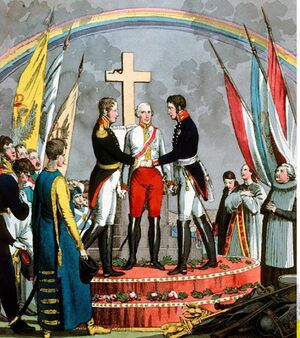Difference between revisions of "1815"
Jump to navigation
Jump to search
1805 < 1806 < 1807 < 1808 < 1809 < 1810 < 1811 <1812 < 1813 < 1814 < 1815 > 1816 > 1817 > 1818 > 1819 > 1820 > 1821 > 1822 > 1823 > 1824 > 1825
(Created page with "{{year |image= |image_width= |image_caption= }} {{SMWDocs}} {{Stub}}") |
(unstub) |
||
| Line 1: | Line 1: | ||
{{year | {{year | ||
| − | |image= | + | |image=Holy alliance.jpg |
|image_width= | |image_width= | ||
| − | |image_caption= | + | |image_caption=The monarchies [[Austria]], [[Prussia]], and [[Russia]] form the [[Holy Alliance]] to repress [[liberalism]] and [[secularism]] in Europe. Its influence lasts for the rest of the century. |
| + | |description=year 1815 | ||
}} | }} | ||
| + | == Events == | ||
| + | * January 3 – [[Austrian Empire|Austria]], Britain, and Bourbon-restored France form a secret defensive alliance treaty against [[Prussia]] and Russia. | ||
| + | * February 3 – The first commercial cheese factory is founded in [[Switzerland]]. | ||
| + | * February 4 – The first Dutch student association, the ''[[Groninger Studentencorps Vindicat atque Polit]]'', is founded in the Netherlands. The first rector of the senate is B. J. Winter. | ||
| + | * February 6 – [[New Jersey]] grants the first American railroad charter to [[John Stevens (inventor, born 1749)|John Stevens]]. | ||
| + | * February 17 – The [[Reconquista (Spanish America)|Spanish reconquest of Latin America]] begins. | ||
| + | * February 26 – [[Napoleonic Wars]]: [[Napoleon]] Bonaparte escapes from [[Elba]]. | ||
| + | * March 16 – [[William I of the Netherlands|William I]] becomes [[Monarchy of the Netherlands|King of the Netherlands]]. | ||
| + | * March 20 – [[Napoleonic Wars]]: [[Napoleon]] enters Paris, after escaping from [[Elba]] with a regular army of 140,000 and a volunteer force of around 200,000, beginning his ''[[Hundred Days]]'' rule. | ||
| + | * April 24 – The [[Second Serbian uprising]] against [[Ottoman Empire|Ottoman]] rule takes place in [[Takovo]], [[Ottoman Serbia]]. By the end of the year Serbia is acknowledged as a semi-independent state; the ideals of the [[First Serbian uprising]] have thus been temporarily achieved. | ||
| + | * May 3 – [[Battle of Tolentino]]: [[Austrian Empire|Austria]] defeats the [[Kingdom of Naples]], which quickly ends the [[Neapolitan War]]. [[Joachim Murat]], the defeated King of Naples installed by Napoleon, is forced to flee to [[Corsica]], and is later executed. | ||
| + | * June 9 – The Final Act of the [[Congress of Vienna]] is signed: A new European political situation is set. The [[German Confederation]] and [[Congress Poland]] are created, and the [[Country neutrality (international relations)|neutrality]] of Switzerland is guaranteed. Also, [[Luxembourg]] declares independence from the [[First French Empire|French Empire]]. | ||
| + | * June 15 – The [[Duchess of Richmond's ball]] is held in [[Brussels]], "the most famous ball in history".<ref>Longford, Elizabeth (1986). "194". In Hastings, Max (ed.). The Oxford Book of Military Anecdotes. pp. 230–234. </ref> | ||
| + | * August 2 – [[Napoleonic Wars]]: Representatives of the United Kingdom, Austria, Russia and Prussia sign a convention at Paris, declaring that Napoleon Bonaparte is "their prisoner" and that "His safe keeping is entrusted to the British Government."<ref>Charles Jean Tristan, Count Montholon, ''History of the Captivity of Napoleon at St. Helen'' (E. Ferrett & Company, 1846) p83</ref> | ||
| + | * September 26 – Austria, [[Prussia]] and Russia sign a [[Holy Alliance]], to uphold the European status quo.<ref>Tim Chapman, ''The Congress of Vienna 1814-1815'' (Routledge, 2006) p60</ref> | ||
| + | * October 15 – [[Napoleonic Wars]]: [[Napoleon]] begins his exile on [[Saint Helena]] in the Atlantic Ocean. | ||
| + | * November 20 – The [[Napoleonic Wars]] come to an end after 12 years, with the British government restoring the status quo of France, prior to when the [[French Revolution]] began in 1789. | ||
| + | * November 27 – The [[Constitution of the Kingdom of Poland]] is signed, creating [[Congress Poland]], a [[constitutional monarchy]] in [[personal union]] with the [[Russian Empire]], under terms agreed at the [[Congress of Vienna]]. | ||
| + | * December 7 – [[Michel Ney|Marshal Ney]] is executed in Paris, near the [[Jardin du Luxembourg]]. | ||
| + | |||
| + | |||
| + | |||
{{SMWDocs}} | {{SMWDocs}} | ||
| − | {{ | + | ==References== |
| + | {{Reflist}} | ||
Latest revision as of 22:45, 13 March 2021
 The monarchies Austria, Prussia, and Russia form the Holy Alliance to repress liberalism and secularism in Europe. Its influence lasts for the rest of the century. | |
| year 1815 |
Contents
Events
- January 3 – Austria, Britain, and Bourbon-restored France form a secret defensive alliance treaty against Prussia and Russia.
- February 3 – The first commercial cheese factory is founded in Switzerland.
- February 4 – The first Dutch student association, the Groninger Studentencorps Vindicat atque Polit, is founded in the Netherlands. The first rector of the senate is B. J. Winter.
- February 6 – New Jersey grants the first American railroad charter to John Stevens.
- February 17 – The Spanish reconquest of Latin America begins.
- February 26 – Napoleonic Wars: Napoleon Bonaparte escapes from Elba.
- March 16 – William I becomes King of the Netherlands.
- March 20 – Napoleonic Wars: Napoleon enters Paris, after escaping from Elba with a regular army of 140,000 and a volunteer force of around 200,000, beginning his Hundred Days rule.
- April 24 – The Second Serbian uprising against Ottoman rule takes place in Takovo, Ottoman Serbia. By the end of the year Serbia is acknowledged as a semi-independent state; the ideals of the First Serbian uprising have thus been temporarily achieved.
- May 3 – Battle of Tolentino: Austria defeats the Kingdom of Naples, which quickly ends the Neapolitan War. Joachim Murat, the defeated King of Naples installed by Napoleon, is forced to flee to Corsica, and is later executed.
- June 9 – The Final Act of the Congress of Vienna is signed: A new European political situation is set. The German Confederation and Congress Poland are created, and the neutrality of Switzerland is guaranteed. Also, Luxembourg declares independence from the French Empire.
- June 15 – The Duchess of Richmond's ball is held in Brussels, "the most famous ball in history".[1]
- August 2 – Napoleonic Wars: Representatives of the United Kingdom, Austria, Russia and Prussia sign a convention at Paris, declaring that Napoleon Bonaparte is "their prisoner" and that "His safe keeping is entrusted to the British Government."[2]
- September 26 – Austria, Prussia and Russia sign a Holy Alliance, to uphold the European status quo.[3]
- October 15 – Napoleonic Wars: Napoleon begins his exile on Saint Helena in the Atlantic Ocean.
- November 20 – The Napoleonic Wars come to an end after 12 years, with the British government restoring the status quo of France, prior to when the French Revolution began in 1789.
- November 27 – The Constitution of the Kingdom of Poland is signed, creating Congress Poland, a constitutional monarchy in personal union with the Russian Empire, under terms agreed at the Congress of Vienna.
- December 7 – Marshal Ney is executed in Paris, near the Jardin du Luxembourg.
Event
| Event | Start | End | Description |
|---|---|---|---|
| Pax Brittanica | 1815 | 1915 |
New Groups
| Group | Image | Type | Description |
|---|---|---|---|
| IGO |  | Military Commercial Financier Public | Highly influential and powerful organizations that legally go beyond borders. IGOs have come very close to forming an actual "new world order" in the 2000s. |
| Vienna University of Technology |  | Technical university in Vienna, Austria |
Births
| Title | Born | Place of birth | Died | Summary | Description |
|---|---|---|---|---|---|
| Otto von Bismarck | 1 April 1815 | Germany Schönhausen Kreis Jerichow II Province of Saxony | 30 July 1898 | Deep politician | German deep politician, Chancellor of the German Empire 1871-1890 |
| Granville Leveson-Gower | 11 May 1815 | London | 31 March 1891 | British Secretary of State who improved relations with the United States |
Many thanks to our Patrons who cover ~2/3 of our hosting bill. Please join them if you can.
References
- ↑ Longford, Elizabeth (1986). "194". In Hastings, Max (ed.). The Oxford Book of Military Anecdotes. pp. 230–234.
- ↑ Charles Jean Tristan, Count Montholon, History of the Captivity of Napoleon at St. Helen (E. Ferrett & Company, 1846) p83
- ↑ Tim Chapman, The Congress of Vienna 1814-1815 (Routledge, 2006) p60